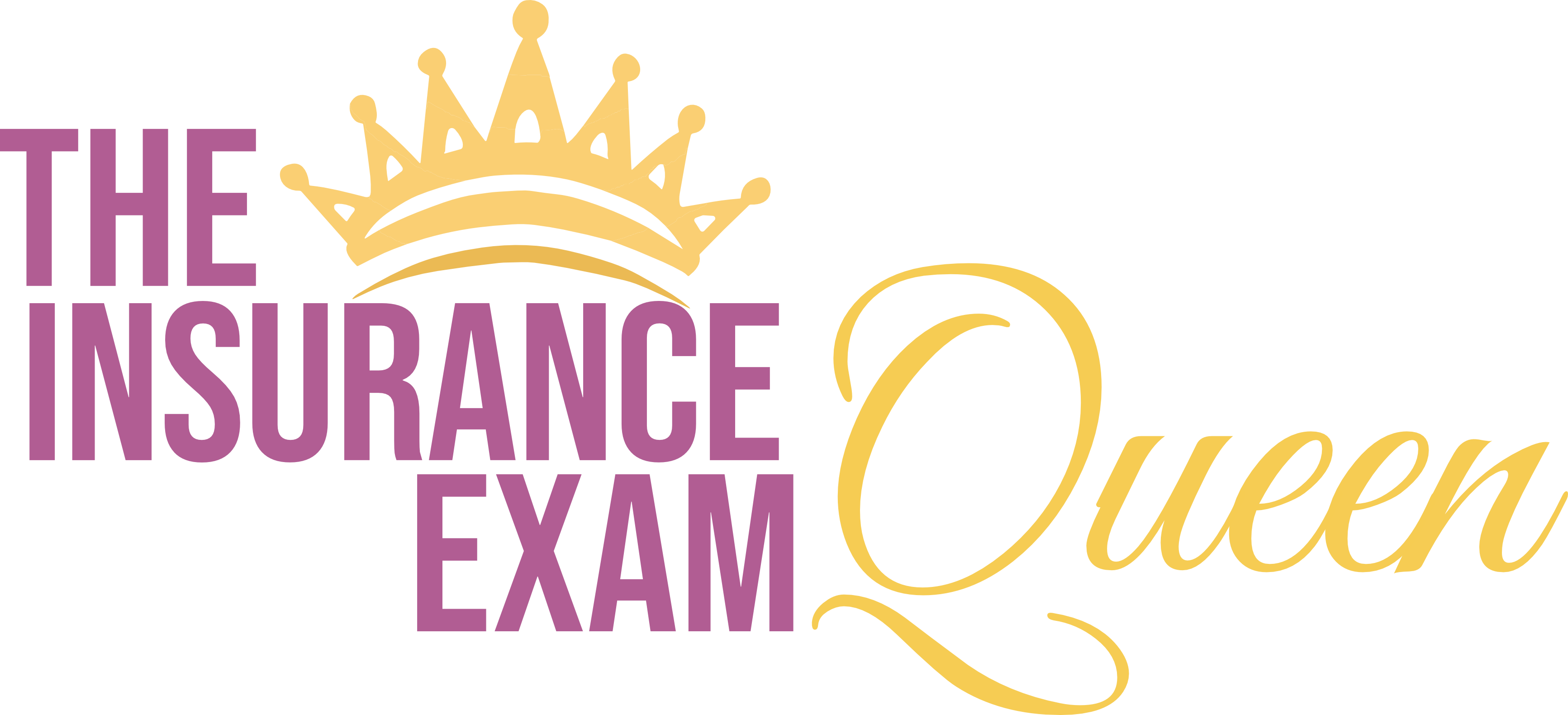Property & Casualty Quick Notes
Study Tip: Make Quick Notes cards with the Bolded words on one side and the definition on the other.
General Topics
Insurable Interest – You must have interest into the item/person you are insuring, meaning you get insurance on cars you own, house your own, etc. For a person, you need to be related/married. The memory trick is BB$. You need BLOOD, BUSINESS or MONEY to get insurance. Friends are NOT someone we have insurable interest with.
Underwriting – Known as the Risk Selection Process. Insurance is the transfer of risk so it’s important to fully assess how much risk a person has to transfer. A person with multiple accidents is more likely to have more claims, so they would be transferring more risk then a person with a clean driving record.
Perils – Perils are the Causes of Loss, the reason you file a claim. A peril is the fire, lightning, wind, hail. Insurance does not cover all possible perils.
Named Peril – A policy that will only cover perils that are named/listed on the policy. If a peril is not named, it’s not covered.
Open Peril – A policy that will cover any perils except what’s excluded. This is a policy that will list out what is NOT covered.
Vacancy – A house is vacant when there are NO people and NO stuff. At 61 days of being vacant, a house will begin to lose coverage.
Unoccupancy – A house that has stuff, but NO people, however the people do intend to come back, like going on a vacation.
Direct Loss – The direct physical damage to property, which includes Proximate Cause of Loss too.
Indirect Loss – The losses that happened because of the direct loss/consequences of the direct loss. A house burning down is the direct loss, and the cost of having to stay at a hotel because of it is the indirect loss.
Blanket Insurance – A single policy that covers multiple classes.
Specific Insurance – A policy that covers a certain thing or its own amount of coverage.
Basic Types of Construction
Fire Restive – A house that is built with material that can resist burning down for up to 2 hours. Fire resistive is the best rating.
Frame – A building that is made of wood which is flammable. Frame is the worst rating.
Loss Valuation – A factor in determining the premium.
Replacement – The brand-new price to replace with similar/same kind or quality at today’s prices. The original price paid is not considered.
Actual Cash Value – The used value to replace things and is calculated by knowing the Replacement value and then subtracting wear and tear (depreciation).
Market Value – What a willing buyer would pay a willing seller.
Functional Replacement – The modern less expensive price to make repairs like using Drywall instead of plaster.
Agreed – A policy that sets the replacement price of an item based on a fair Valuation of the item. Agreed is used for an item that doesn’t fluctuate much in value.
Stated – A policy that sets a Maximum limit that the insurer will pay up to if the item suffers a covered peril.
Damages
Property Damage – Direct damages to property.
Bodily Injury – Direct damage to a person’s body.
$pecial Damages – Medical bill$ and loss of wages after an accident.
General Damages– Pain and Suffering, Mental anguish – very subjective.
Punitive – For punishment.
Absolute Liability – Obviously dangerous e.g. Swimming Pools and a Pet Tiger.
Strict Liability – Strictly products.
Vicarious Liability – The parent is responsible for the acts for the child, the employer is responsible for the acts of the employee.
Policy Structure
Declarations – The first page of the policy and is a policy summary of who and what is covered, by what company and for what amount.
Definitions – Explains certain meanings of words used in the policy.
Insuring Agreement/Clause – Lists the perils insured against as well as contains the promise to pay and the parties of the contract (Parties, perils, promise, period).
Additional/Supplementary Coverage – Built in extra coverage to all the policies at no additional cost.
Conditions – A part of the policy that lists the rules, duties, obligations, ways of behaving for both the insured and insurer.
Exclusions – A part of the policy that lists what is NOT covered.
Endorsements – Written changes made to amend the policy, if added coverage via an endorsement, it will raise the premium.
Certificate of Insurance – A document that states the insured has coverage.
Common Policy Provisions
Insured – An insured is anyone covered by the policy.
First Named Insured – In a Commercial (business) policy, the first named insured is the designated person who manages the policy for the business.
Named Insured – The person who bought the policy and is listed on the Declaration Page.
Additional Insured – The mortgage/lien holder added via an endorsement in regard to a specific interest (mortgage/car loan).
Policy Period – How long a policy covers an insured.
Policy Territory – Where the coverage is active (US, Canada, US territories).
Policy Limits – The most amount of money the insured can collect under the policy.
Limits of Liability – The max amount of money the insurer is liable to pay.
Cancellation – Terminating an in force policy.
Non-renewal – Termination of a policy at expiration.
Deductibles – The amount of money the insured pays first before the insurer pays.
Coinsurance – A rule that says an insured needs to carry at least 80% of the replacement cost of the home in order to have the full claim covered. If an insured carries less than 80%, the insurer will use the coinsurance equation to reduce the amount they pay for a claim.
Other Insurance – Provisions in the policy that explain if there is more than one policy covering a loss, they will all need to pay a fair share of the loss to protect indemnity.
Aggregate Limit – The max available money on the policy for all claims.
Per Occurrence – The sublimit of liability that sets a maximum for all claims arising from one accident/occurrence.
Per Person – The max available limit in an accident for one person.
Split Limit – Separately stated limits of liability – Per person/per accident.
Combined Single Limit – A single dollar limit available for all claims from one accident without breaking it up by person, bodily or property.
Theft – The act of stealing.
Burglary – Breaking and entering, forced entry causing damage.
Robbery – Stealing while a person is a witness/victim.
Recommended: Gold
The GOLD Course is ALWAYS the recommended class series for all students as it teaches the material in more depth. Over 30 hours of the most in depth classes with a more intensive teaching of the topic. Learn more about P&C GOLD
Share the Post
Click to share the post to your network





